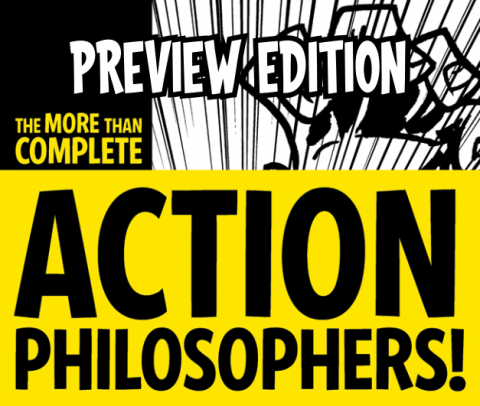On January 28, 1948 the British philosophers F.C. Copleston and Bertrand Russell squared off on BBC radio for a debate on the existence of God. Copleston was a Jesuit priest who believed in God. Russell maintained that while he was technically agnostic on the existence of the Judeo-Christian God–just as he was technically agnostic on the existence of the Greek gods Zeus and Poseidon–he was for all intents and purposes an atheist.
The famous debate is divided into two parts: metaphysical and moral. In the metaphysical part, which is presented here, Copleston espouses what is known as the cosmological argument for the existence of God. Elements of the cosmological argument go back at least as far as Plato and Aristotle, who held that the universe required a “prime mover” outside of itself. The version embraced by Copleston is derived from one of Thomas Aquinas’ five ways to prove the existence of God. In his Summa Theologica, Aquinas writes:
The third way is taken from possibility and necessity and runs thus. We find in nature things that are possible to be and not possible to be, since they are found to be generated and corrupted. But it is impossible for these always to exist, for that which can not-be at some time is not. Therefore, if everything can not-be, then at one time there was nothing in existence, because that which does not exist begins to exist only through something already existing. Therefore if at one time nothing was in existence, it would have been impossible for anything to have begun to exist; and thus now nothing would be in existence–which is absurd. Therefore, not all beings are merely possible, but there must exist something the existence of which is necessary. But every necessary thing has its necessity caused by another, or not. Now it is impossible to go on to infinity in necessary things which have their necessity caused by another, as has already been proved in regard to efficient causes. Therefore, we cannot but admit the existence of some being having of itself its own necessity, and not receiving it from another, but rather causing in others their necessity. This all men speak of as God.
Copleston adopts Gottfried Wilhelm Leibniz’s Principle of Sufficient Reason as a cornerstone of his argument. In his 1714 essay “The Principles of Nature and Grace, Based on Reason,” Leibniz asserts that nothing can exist without a sufficient reason, including the Universe. “This sufficient reason for the existence of the Universe cannot be found in the series of contingent things,” writes Leibniz. “The sufficient reason, therefore, which needs not further reason, must be outside of this series of contingent things and is found in a substance which…is a necessary being bearing the reason for its existence within itself; otherwise we should not yet have a sufficient reason with which to stop. This final reason for things is called God.”
Russell takes exception to Copleston’s use of Leibniz’s concept of a necessary being. The term “necessary,” he argues, can only be applied to analytic propositions–propositions which are derived logically and which would be self-contradictory to deny. An analytic proposition would fall under Leibniz’s category of “truths of reason,” or a priori truths. Yet Copleston admits his argument is based on a posteriori grounds, or what Leibniz called “truths of fact.” Russell first poked holes in Leibniz’s version of the cosmological argument nearly half a century before his debate with Copleston. In A Critical Exposition of the Philosophy of Leibniz, published in 1900, Russell says of the cosmological argument:
It has a formal vice, in that it starts from finite existence as its datum, and admitting this to be contingent, it proceeds to infer an existent which is not contingent. But as the premiss is contingent, the conclusion also must be contingent. This is only to be avoided by pointing out that the argument is analytic, that it proceeds from a complex proposition to one which is logically presupposed in it, and that necessary truths may be involved in those that are contingent. But such a procedure is not properly a proof of the presupposition. If a judgement A presupposes another B, then, no doubt, if A is true, B is true. But it is impossible that there should be valid grounds for admitting A, which are not also grounds for admitting B. In Euclid, for example, if you admit the propositions, you must admit the axioms; but it would be absurd to give this as a reason for admitting the axioms.
Perhaps the most memorable moment of the debate on the cosmological argument comes near the end, when Russell criticizes Copleston’s assertion that because everything contained within the Universe is contingent, the Universe as a whole must also be contingent. “I can illustrate what seems to me your fallacy,” says Russell. “Every man who exists has a mother, and it seems to me your argument is that therefore the human race must have a mother, but obviously the human race hasn’t a mother–that’s a different logical sphere.” For Russell it was enough to accept that the Universe simply exists. Or as David Hume points out in his Dialogues Concerning Natural Religion, if there must be a necessarily existent being, why can’t it be the Universe as a whole?
The audio version of the debate above is abridged. To read a transcript of the entire debate, click here to open the text in a new window.
Related content:
Face to Face with Bertrand Russell: ‘Love is Wise, Hatred is Foolish’
Three Passions of Bertrand Russell (and a Collection of Free Texts)




